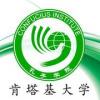By Jessica Powers
The recipe for success may be as simple as combining your favorite recreational activity and your field of study, at least in the case of Matthew Massey; avid rock climber, doctoral graduate in Earth and Environmental Sciences and winner of the Journal of Structural Geology’s Student Author of the Year Award for 2011.
Initially, Massey’s research on “Microstructure and crystallographic preferred orientation of polycrystalline microgarnet aggregates developed during progressive creep, recovery and grain boundary sliding” had everyone interested, and slightly confused because his research was so new and innovative. No one had seen those types of garnets in rocks or had thought to analyze them in the manner










